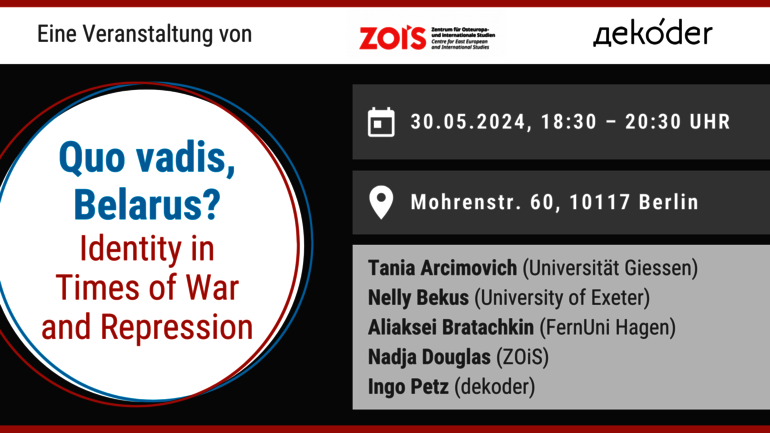National Identity in Times of War and Repression
Mohrenstr. 60
10117 Berlin
National Identity in Times of War and Repression
Mohrenstr. 60
10117 Berlin

With Nelly Bekus, Aliaksei Bratachkin & Tania Arcimovich
In English and German with simultaneous translation.
Belarus is currently at perhaps the most important crossroads in its recent history. Almost four years after the 2020 protests, it seems that Belarusian society is increasingly divided into at least two major camps with differing visions of identity and historical narratives. Moreover, Russia’s war in Ukraine has demonstrated the gradual loss of national sovereignty and an increasing orientation towards Russia.
The country’s nation-building process over the past thirty years since independence has been anything but straightforward. Initially typical of nations with a Soviet past, the process of national consolidation in Belarus during the post-Soviet period has become particular, with some scholars even attributing terms such as “retarded” or “delayed” to describe it (compared to neighbouring states such as Lithuania and Ukraine). The consolidation of statehood had various dimensions, ranging from an appreciation of Soviet era achievements in Belarusian national development, to a virtual denial of a Belarusian identity (also discussed as “national nihilism”), to a national awakening in opposition to the Soviet past and challenge to the Lukashenka regime. Historical memory and language policy have always played a crucial role in the realisation of Belarusian identity.
The current struggle and claim to “Belarusian Nationalism” as well as the re-appropriation of historical memory between opposition groups in exile and the Belarusian elites in power have further contributed to deepening divisions. The Lukashenka regime’s reliance on violent repression has made it impossible to discuss alternative visions of identity inside the country. Ultimately, the lack of national cohesion could become a factor of insecurity for the country.
The panel will consist of three speakers of Belarusian origin with diverse backgrounds. During the event, we will discuss both the historical dimension of Belarusian national identity and its current implications.
Speakers:
- Nelly Bekus is a lecturer at the University of Exeter. In her research, she explores the history of post-communist transformation, nation-building, linguistic identity, the history of cultural heritage and memory, and identity politics.
- Aliaksei Bratachkin is a Belarusian historian. From 2013 to 2021, he headed the Public History Department at the independent European College of Liberal Arts in Belarus (ECLAB), which was forced to shut down its activities by the state in 2021. Since 2022, he is a member of staff at the Institute of History at the FernUniversität Hagen (Chair of Public History).
- Tania Arcimovich is a scholar, author and curator from Minsk. Recently, she has defended her PhD at Justus Liebig University in Gießen. She was an editor of pARTisan/pARTisanka Magazine of Belarusian Contemporary Culture and co-founder of Kaptaruny Art Village in Belarus.
Chairs: Ingo Petz (editor, dekoder) and Nadja Douglas (researcher, ZOiS)